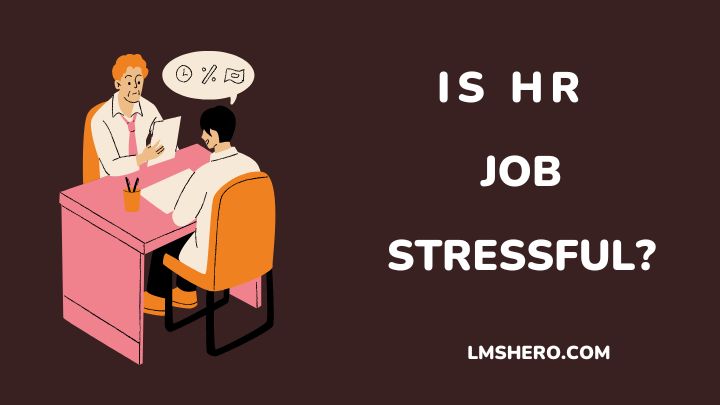An HR (human resource) professional manages the employee life cycle (i.e., recruiting, hiring, onboarding, training, and termination) and as well handles employee benefits. However, it is commonly asked if an HR job is stressful.
While every other role appears to be challenging, the HR role is typically regarded as the most stressful in every company.
The HR role cuts across multiple departments in the company, and the HR department is arguably the most stressful department in every company.
This article explores the role of HR, its core responsibilities, and other necessary information about the role.
Read to learn more.
Who is an HR?

Human resources (HR) is the department of a company that is in charge of sourcing, screening, recruiting, and training job candidates.
Nowadays, human resources play a critical role in helping businesses to deal with the rapid change of business climate and a higher demand for quality employees, as well as manage their benefit plans.
Over the years, in addition to their job, the HR department is also responsible and tasked to resolve conflicts between employees and their employers.
What does HR do?
Typically, when asked about the role of an HR, most employees often about the upsetting part of the job, such as HR violations, layoffs, and firing. However, the reality is that human resources exist to help employees.
The following are some of the common roles that the HR department plays in every organization:
1. Find candidates
When recruiting for open roles, HR must be aware of the needs of the organization and ensure that those needs are addressed, such as conducting market research, managing budgets, and communicating with stakeholders.
Following that, further research will be conducted to ensure that the best candidates are attracted and presented. So, HR is responsible for all these.
2. Hire the right personnel
After finding the right candidates, the HR department conducts interviews, manages the hiring process, and helps onboard successful candidates.
Furthermore, they are responsible for ensuring that all hiring-related paperwork is completed and that the first day and every consecutive day are successfully handled.
3. Handle payroll
HR is also responsible for handling payroll, calculating taxes, and the work hours of every employee.
4. Enforce disciplinary action
This is possibly why human resources have a negative reputation. When handled incorrectly, disciplinary actions can lead to the loss of a valuable employee, litigation, or a terrible reputation. However, it might result in an employee’s success if handled perfectly.
As a result, it is up to HR to establish a solid enough rapport with managers and staff members to assess a team’s cohesion and general health.
5. Reinforce company policies
Every year, as the company changes, policies need to be modified (or at least reviewed). Hence, it is HR’s responsibility to update policies and propose changes when they are no longer beneficial to the business or the employees.
Every company policy should often be revised, and in every case, HR should be consulted before making these decisions.
6. Keep employee records
It is required by the law for HR to keep employee records, as they may help organizations identify skill gaps and aid the hiring process. They also include personal information and emergency contact information for each employee.
7. Conduct benefit analysis
When attempting to entice top talent, maintaining competition is crucial. A talented hire can select a different organization with lower compensation if the benefits are more alluring.
To determine whether similar businesses’ perks are competitive, HR should regularly look at them by conducting a benefit analysis.
Why is an HR job considered stressful?
Generally, that workplace stress is common and not limited to certain jobs. Every job is stressful. The following are the causes of HR job stress:
- Being assigned too many tasks
- Unrealistic deadlines
- Being underpaid
- Work-life imbalance
- Working extra hours
- Harassment by supervisors/coworkers
- Toxic work environment
Tips for managing stress as HR
Lack of workplace stress management often contributes to the illness and absenteeism of employers, which results in poor work performance.
As a result, it is essential to take effective measures to combat stress in the workplace. The following steps are tips for managing workplace stress and enhancing productivity for organizational growth:
1. Acknowledge that the HR job is stressful
It is crucial that you don’t battle reality or waste time and energy wishing human resources were easier. Recognize that unpleasant situations and difficulties are inevitable in human resources.
Always approach complex personnel issues with a positive attitude, as if you were trying to solve a difficult puzzle. Additionally, remember that every problem has multiple solutions.
2. Talk to HR experts
Don’t be the lone Rambo or Rambette, regardless of whether you’re taking things too personally, overwhelmed by a big staff reduction, or anxious about updating a computer system.
Reach out for specialized assistance. Whenever possible, collaborate with an Employee Assistance Program counselor, especially when dealing with dissatisfied or dysfunctional employers.
3. Consider the employee’s point of view
It is certainly simpler to say than to do. However, there are likely particular causes for a person’s challenges at work.
Have they always behaved in this manner, or do new variables contribute to the issue? If so, what are these contributing causes, and how may they be resolved?
Invest time to analyze troublesome circumstances with a comprehensive perspective. Try to understand why a worker is performing as they are. This will help you in identifying practical answers and avoiding future problems.
4. Set boundaries to promote independence
These three ways of establishing boundaries will allow the HR professional to successfully balance multiple duties and responsibilities.
- Delegation: This is important to allow people to use their skills and knowledge while monitoring their performance.
- Education: Not letting other employees not only depend on your expertise is also another way to reduce stress. In today’s time- and the task-driven world, educating employees and managers on HR-related procedures is important.
- Separation: Create space-time dynamics for HR’s optimal performance. Design a form and function arrangement that allows for only vital HR and employee dependence.
5. Don’t be scared to ask for help
This is an easy task that is sometimes overlooked. Help is available if your group comprises more than just you.
So, you should find someone who could have a different viewpoint on a challenging situation. However, be careful not to breach confidentiality.
You can ask for help from:
- An HR peer
- Your direct manager
- The employee’s boss
- A member of the leadership board
FAQs
What are the principles of HR?
Typically, HR has 5 principles, which are to managing talent, pay and benefits, training and development, compliance, and safety in the workplace.
What makes a successful HR?
A successful HR prioritizes consistent payroll and ensures that all employee benefits are functional.
They also understand the impact that company culture, employee development, and career opportunities have in motivating and retaining employees.
How can HR add value to the company?
HR can add value to a company by playing a role in shaping the future of the organization by driving efforts such as talent mapping, workforce flexibility, strategic planning and management, performance evaluation, and retraining.
Conclusion
In every organization, the HR department plays a crucial role in shaping the organization’s culture. The fact is, if HR really cares about the well-being of employees, the culture will be one of openness and growth.
Because HR jobs require so many different skills and qualifications, they are thought to be well-paid and one of the most important jobs in every company.
However, there is a lot of competition in the HR field because it is in high demand and offers some of the best-paying jobs in the country, and to get a well-paying HR job, you must have the right skills.
I hope you found this article interesting. You can also read to know the core responsibilities of human resources.
Thanks for reading.







